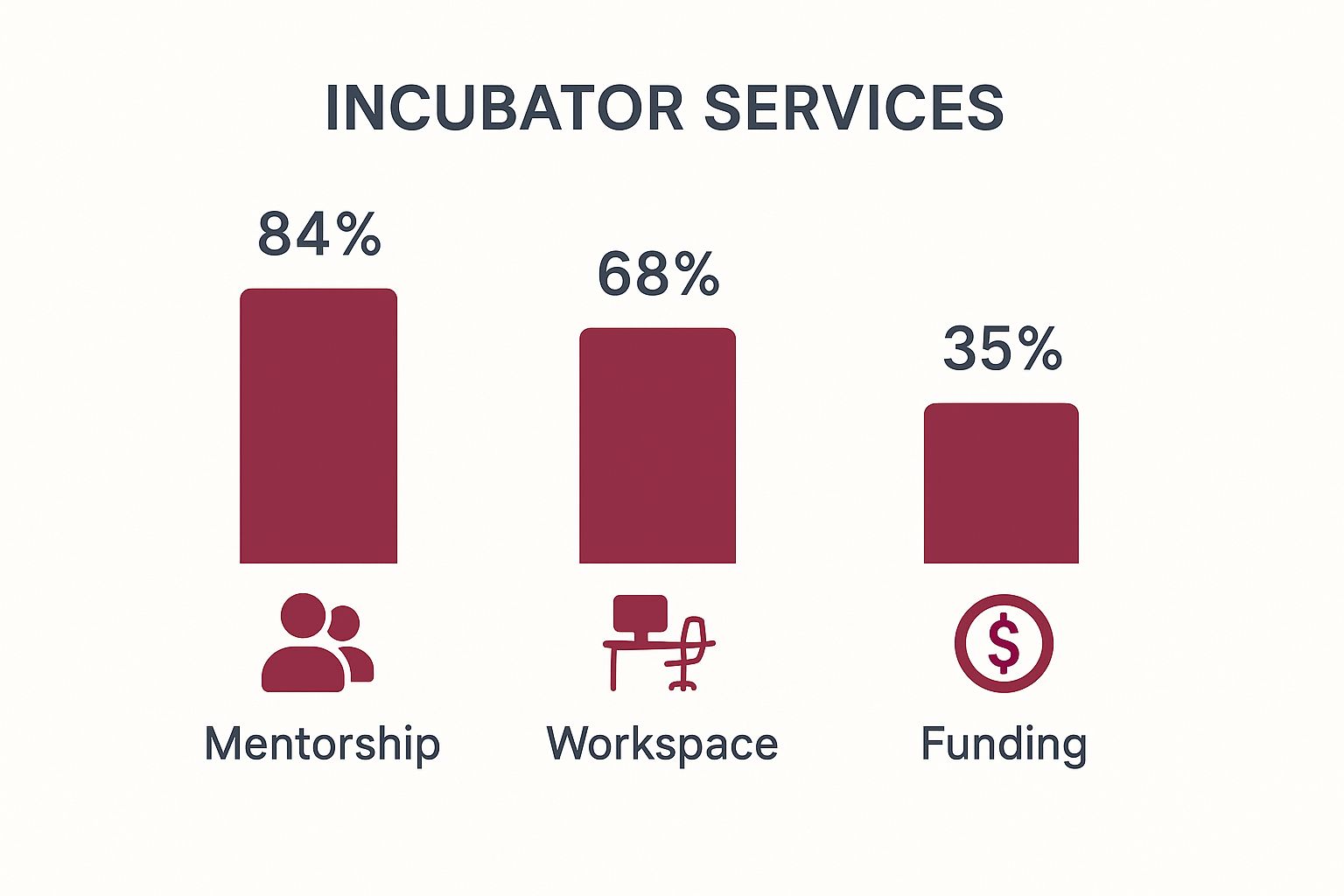Top Small Business Incubator Programs to Accelerate Growth
- sultan mbs
- Aug 7, 2025
- 14 min read
Ever heard someone call a startup incubator a "greenhouse for new businesses"? It's a pretty spot-on analogy. At their core, small business incubator programs are supportive environments built to help new companies get through those shaky, early days when they're most vulnerable.
These programs take a fragile idea and give it the perfect conditions to grow into a strong, self-sufficient business.
What Exactly Is a Small Business Incubator?

Let's be clear: a good incubator offers a whole lot more than just a desk and some Wi-Fi. It's a well-oiled program designed to give early-stage companies a powerful mix of resources, mentorship, and a built-in community. The main goal? To take as much risk as possible off the founder's plate.
The startup journey is notoriously tough. Incubators help founders dodge the common bullets that take down so many new ventures—things like running out of money, making a critical legal mistake, or completely missing the mark on what customers actually want. It's this nurturing environment that can dramatically tilt the odds in favor of long-term success.
The Core Components of Support
At the heart of any great incubator is a support system with many moving parts. This isn't just about giving you a place to work; it's about laying a solid foundation for growth you can actually sustain. Founders get their hands on resources that would otherwise be way too expensive or just plain hard to find on their own.
This support network usually includes:
Expert Mentorship: Getting real-world guidance from seasoned entrepreneurs and industry experts who’ve already been there and done that.
Essential Services: Access to shared professional services like legal advice, accounting, and marketing support, often at a fraction of the normal cost.
Collaborative Community: You're literally surrounded by other driven founders, which naturally leads to collaboration, shared "aha!" moments, and mutual encouragement.
The real magic of an incubator is how it shortens the learning curve. Instead of stumbling through years of trial and error, it gives entrepreneurs a framework to build their business with intention.
A Quick Glance at What Incubators Provide
To paint a clearer picture, let's break down what you can typically expect. While every program has its own flavor, most are built around a common set of pillars designed to foster stability and growth. Knowing these components will help you figure out which small business incubator programs might be the right fit for your idea.
The table below breaks down the key elements you'll find in most incubator programs, showing how each piece directly helps a startup get off the ground and find its footing in the market.
Core Components of a Business Incubator Program
Component | Description | Benefit for Startups |
|---|---|---|
Workspace & Facilities | Access to affordable office space, meeting rooms, and shared equipment. | Reduces overhead costs and provides a professional environment for operations and meetings. |
Mentorship & Coaching | One-on-one and group guidance from experienced entrepreneurs and industry veterans. | Offers invaluable strategic advice, helps avoid common mistakes, and accelerates problem-solving. |
Networking Opportunities | Curated introductions to investors, potential partners, clients, and industry influencers. | Builds a critical professional network that can open doors to funding, sales, and partnerships. |
Business Support | Assistance with fundamental business needs like legal formation, accounting, and HR. | Ensures the company is built on a solid operational and legal foundation from day one. |
Ultimately, these components work together to create an ecosystem where a new business has the best possible chance to not just survive, but thrive.
The Real-World Benefits of Joining an Incubator
Let’s be honest, joining an incubator is about much more than just getting a desk and some decent Wi-Fi. The real payoff comes from the tangible advantages that give a fledgling startup a fighting chance in a ridiculously crowded market. These programs are designed to completely change a company's trajectory, surrounding it with a support system that would be impossible to build on its own.
Think about it. Imagine having a seasoned entrepreneur on speed dial, ready to help you dodge the common, costly mistakes that sink so many new businesses. Picture getting a warm introduction to your first major client or a key strategic partner, not through a cold call, but through the incubator's trusted network. This is the kind of insider access we’re talking about.
Gaining Critical Business Momentum
One of the first things you'll notice is the power of the environment itself. You’re immediately plugged into a community of driven founders who are all wrestling with similar challenges. This creates a powerful culture of shared knowledge and mutual accountability that keeps you focused and pushing forward.
A huge part of this is gaining access to proven methodologies and concrete support for effective small business growth strategies. Instead of just guessing what might work, you’re handed a playbook that’s been tested and refined by those who’ve already succeeded.
The core advantage of an incubator isn't just about surviving those brutal early stages; it’s about building a resilient company equipped with the tools and connections needed for long-term health and profitability.
Access to Essential Resources and Funding
Beyond the mentorship, incubators open the door to a goldmine of practical resources that are absolutely critical for getting off the ground. These often include:
Valuable In-Kind Services: Think professional legal, accounting, and marketing help. This support is often provided at a massive discount—or even included in the program—saving you precious cash when you need it most.
Seed Funding Opportunities: Many incubators have direct lines to angel investors and venture capitalists. Some even provide the initial seed funding themselves, giving startups that crucial financial runway to operate and grow.
Expert Guidance: You’ll find yourself in workshops and one-on-one coaching sessions covering everything from nailing your product development to perfecting your investor pitch.
This kind of built-in infrastructure is a massive driver for local economies. By arming new ventures with these resources, incubators become a cornerstone of what is economic development.
This support is more important than ever when you look at the global picture. Entrepreneurship is a huge engine for economic growth worldwide, with a global startup growth rate of 21% annually. But of the nearly 665 million entrepreneurs out there, most are struggling with a severe lack of resources. That's precisely the gap that incubators were created to fill.
Incubators Versus Accelerators: Which Is Right For You?
Plenty of founders toss the terms "incubator" and "accelerator" around like they’re the same thing, but they serve completely different purposes. Honestly, picking the wrong one can be a massive waste of time and energy when you can least afford it.
The key is to get brutally honest about what stage your business is in and what you actually need right now.
Think of it this way: a small business incubator program is like a nursery for a brand-new idea. Its whole job is to create a sheltered, resource-rich space to help a fragile concept grow into a stable, healthy business. The focus is all on nurturing, building a solid foundation, and figuring out if the business model even works.
An accelerator, on the other hand, is more like a boot camp for a startup that’s already up and running. It’s designed to take a company that has a validated product and some early traction and slam it into high gear. The goal is simple: scale up, and do it fast.
Key Differences In Program Structure
The day-to-day experience inside these programs is night and day. Incubators usually have a more flexible, open-ended timeline—sometimes lasting for years. They're far less structured, focusing instead on providing ongoing mentorship and resources as your company hits different milestones.
Accelerators are all about speed and intensity. They run on a fixed schedule, typically 3-6 months, and push founders through a tough, cohort-based curriculum. Everything builds toward a "Demo Day," where you pitch your supercharged business to a room packed with investors.
Comparing Funding and Focus
The way they handle money also shows what they’re really about. Incubators may or may not take an equity stake. Many are nonprofits or tied to universities, often funded through grants or as part of a public-private partnership. If you want to see how that works in the real world, you can check out these top public-private partnership examples.
Accelerators almost always invest a set amount of seed capital in exchange for a slice of the company, typically 5-10%. Their entire business model is hitched to the future success of the startups they back.
This image gives a great overview of the core services you can expect from most incubator programs.

As you can see, things like mentorship and a place to work are foundational pillars. Direct funding is a bit less common but still a major piece of the puzzle for many.
Ultimately, the most important question to ask yourself is this: "Do I need to build a business, or do I need to scale a business?" Your answer will point you straight to either an incubator or an accelerator.
To make the choice even clearer, let's break it down side-by-side.
Incubator vs. Accelerator At A Glance
This table cuts right to the chase, comparing the most important characteristics of incubators and accelerators.
Characteristic | Small Business Incubator | Business Accelerator |
|---|---|---|
Ideal Stage | Idea or early-prototype stage | Existing product with early traction |
Primary Goal | Develop a viable business model | Achieve rapid growth and scale |
Duration | Long-term (1-5 years), flexible | Short-term (3-6 months), fixed |
Funding Model | Often no equity; may have rent | Seed investment for equity stake |
Pace | Nurturing and self-paced | Intense, structured, and fast |
Looking at them this way, the right path for your company should start to become much more obvious. One is about careful cultivation, the other is about controlled explosion.
How to Find and Choose the Right Incubator Program

Finding the perfect small business incubator isn't something you can knock out with a quick online search. It’s a deliberate, strategic hunt to land your company in an environment that actually gets what you’re trying to build and can help you get there.
The best way to start is right in your own backyard. Look locally first, then broaden your search. These local groups have a real stake in seeing you succeed.
University Innovation Hubs: Don't sleep on local universities. Many have killer programs designed to turn academic research or student ideas into real-world companies.
Local Economic Development Agencies: These are the city or county groups whose whole mission is to create jobs. They often run or fund excellent incubators to do just that.
Industry-Specific Networks: If you’re in a niche field, your trade association is one of the best places to get the inside scoop on specialized incubators.
Evaluating Potential Programs
Once you’ve got a shortlist, the real work begins. You have to look past the slick marketing brochures and figure out what each program is truly about. Not all small business incubator programs are built the same, and the "best" one is the one that’s the best fit for you.
First, check their industry focus. If you're building a sustainable consumer brand, a FinTech incubator isn’t going to do you much good. Look at their stated specialty, but more importantly, look at the actual companies they’ve helped grow.
One of the most telling signs of a quality incubator is the success of its alumni. A strong track record of graduates who have secured funding, achieved market traction, or been acquired speaks volumes about the program's real-world impact.
You also need to scrutinize the mentor network. Are the mentors just impressive names on a website, or are they genuinely in the trenches with the startups? Big difference.
Look Beyond the Brochure
The most critical step? Getting the unfiltered truth from people who've been there. The legalese in an agreement tells you the terms, but it can't tell you about the culture or the day-to-day value you'll get.
Track down founders of companies currently in the program or those who just graduated. Ask them direct questions: What was great? What was a waste of time? What surprised you? That insider perspective is pure gold.
Some incubators are also fantastic at plugging you into the local scene, so it pays to understand the best sources for funding for community projects to see how the whole ecosystem works. This kind of on-the-ground research is what will give you the confidence to make the right call.
A Look Inside Top Small Business Incubator Programs
Theory is one thing, but seeing how the best small business incubator programs actually work in the real world is what makes the whole idea click. The truth is, there’s a huge variety out there. Different programs are built for specific industries, different stages of a business, and wildly different missions.
When you start digging in, you see there’s no single recipe for success. Some of the best programs are baked into universities, fantastic at spinning deep-tech research into actual companies. Others are run by big corporations looking for startups to solve a specific problem they have. You’ll also find non-profits laser-focused on companies trying to make a social or environmental mark. This variety is what makes the whole ecosystem so powerful.
And it’s a growing ecosystem, no doubt about it. The global market for business incubators was recently valued around USD 25.93 billion, with experts thinking it could climb to USD 44.15 billion by 2032. The most popular models are the comprehensive ones—the incubators that offer a bit of everything—which make up 46.2% of the market. It just goes to show how much founders crave that all-in-one support. You can dive deeper into these numbers in the full research about the business incubator market.
Premier Example: Y Combinator
When you hear "startup," it's hard not to think of Y Combinator (YC). While it's technically an accelerator, its influence on incubators and the entire support world is undeniable. YC is legendary for its intense, group-based programs and a network of alumni that reads like a who's who of tech giants—Airbnb, Dropbox, and Stripe all came through its doors.
The first thing you see on their site is their guiding principle: "Make something people want." It’s a simple phrase that has become a mantra for thousands of founders trying to build something that matters.
YC’s incredible success really proves the power of a concentrated, high-impact program. You could argue its alumni network is its single greatest asset, giving new founders an inside track to advice, partnerships, and, of course, funding.
Niche and Regional Incubators
It’s not all about the big, famous names, though. Specialized and local incubators are playing a huge role in communities everywhere.
You might see a city launch an incubator focused squarely on bringing its downtown back to life, helping new businesses open up in empty storefronts and create a real sense of place. This is exactly the kind of thinking behind initiatives like the Jenks Renaissance Downtown Master Plan, which aims to spark local economic fire and get the community involved.
These smaller, more focused incubators often fall into a few different buckets:
University-Affiliated Incubators: These are often the bridge between the lab and the real world. They take groundbreaking research from science and engineering departments and help turn those academic ideas into products people can actually buy.
Corporate Incubators: A big company might start its own incubator to stay ahead of the curve. They’re usually looking for startups that can help them innovate, hoping to find future partners or even companies to acquire down the road.
Social Impact Incubators: These programs champion ventures—both for-profit and non-profit—whose main goal is to tackle a social or environmental problem. For them, success is measured just as much by the positive change they create as it is by their revenue.
By shining a spotlight on their successful alumni, these programs offer real, tangible proof of what a great support system can do. Seeing these different models in action gives you a much clearer picture of what’s out there and helps you figure out what kind of environment would be the perfect fit for your own big idea.
The Future of Business Incubation

The world of entrepreneurship never sits still, and small business incubator programs are evolving right alongside it. The old model—think a shared physical office and a pot of coffee—is expanding to meet the needs of a more global and flexible generation of founders. These support systems are becoming far more dynamic, constantly adapting to back the next wave of game-changing ideas.
One of the biggest shifts we're seeing is the explosion of virtual and remote incubator programs. These models completely shatter old geographical barriers, giving founders a level of freedom we've never seen before. You no longer have to uproot your life and move to a major tech hub to get top-tier mentorship and resources. This change opens the door to a worldwide pool of talent and investors.
This digital-first approach is also what’s fueling some serious market growth. The business incubator market jumped from $24.88 billion to $26.82 billion in just the last year, a pretty clear sign of just how vital these programs have become. And the trend isn't slowing down. Forecasts show the market is on track to hit $35.85 billion by 2029, driven by these new virtual models and a surge in sustainability-focused startups.
The Rise of Hyper-Specialization
Another key trend I'm seeing everywhere is a move toward hyper-specialization. Those generic, one-size-fits-all programs are fading. In their place, we're getting incubators with a laser focus on specific, often incredibly complex, niche industries.
This shift from broad support to deep, concentrated expertise allows incubators to offer guidance that is far more targeted and, frankly, more valuable. Instead of getting general business advice, founders are paired with mentors who truly get the specific challenges and opportunities within their unique field.
This specialization is creating a whole new support landscape for founders. We're now seeing dedicated incubators for things like:
Sustainable Tech: Programs built specifically for "green startups" that are creating solutions for climate change and environmental protection.
AI Ethics: Focused guidance for companies developing responsible and ethical artificial intelligence.
Decentralized Finance (DeFi): Specialized support for founders navigating the world of blockchain technology and new financial systems.
This kind of focus mirrors the strategic economic development happening in ambitious local projects, like the one detailed in the [downtown master plan for Jenks](https://www.thetendistrict.com/jenks/ask-jenks-the-downtown-master-plan-with-marcae-hilton), where the goal is to build a very specific community and commercial identity. It’s an approach that ensures the support you get isn't just helpful—it's directly relevant to your startup's unique journey.
Answering Your Questions About Incubators
If you're a founder thinking about an incubator, you probably have a lot of practical questions. It can feel like a big, intimidating step, but once you get a handle on the financials, what they look for, and what they expect from you, the whole process starts to make a lot more sense. Let's clear up some of the most common questions.
How Much Do Incubator Programs Cost?
There's no single price tag on small business incubator programs. The cost really runs the gamut because different programs are built on completely different financial models.
You'll generally see one of three approaches:
Equity-for-Service: This is a classic model. The incubator provides mentorship, office space, and a network, and in return, they take a small piece of your company. We're usually talking about an equity stake of 1-5%.
Fee-Based: Some programs operate more like a supercharged co-working space. You pay a monthly fee for your spot and all the program perks that come with it. It's straightforward, like a landlord who also happens to be a business coach.
Government-Funded: Many incubators tied to universities or local economic development groups are funded by grants. For startups, this is a huge win, as these programs are often free or extremely low-cost.
What Is the Top Reason Startups Get Rejected?
A great idea gets you in the door, but it’s rarely what gets you accepted. More often than not, the number one reason a startup gets turned down is a perceived weakness in the founding team.
Selection committees are betting on people. They want to see a well-rounded team with skills that complement each other, a deep passion for what they're building, and—this is key—a willingness to be coached.
An A+ team with a B+ idea is almost always more attractive to an incubator than a B+ team with an A+ idea. They bet on the people first.
Other deal-breakers? A fuzzy, poorly defined market or coming to the table with zero proof that you’ve actually talked to potential customers to see if they'd use your product.
Can I Join an Incubator as a Solo Founder?
Absolutely. You can definitely get into an incubator as a solo founder, but you have to be smart about it.
Your mission is to prove you have the grit, the skills, and a rock-solid plan to either execute on your own or build a team very quickly. Show off your personal strengths and highlight any traction you've already made. Be ready for tough questions about how you’ll handle the massive workload. Plenty of programs are happy to back a single entrepreneur, especially if they show incredible promise and a vision that's been truly thought through.
At The Ten District, we champion the entrepreneurial spirit that builds vibrant communities. Explore our unique mix of local shops and dining to see what inspired founders have created right here in Jenks. Learn more at https://www.thetendistrict.com.



Comments